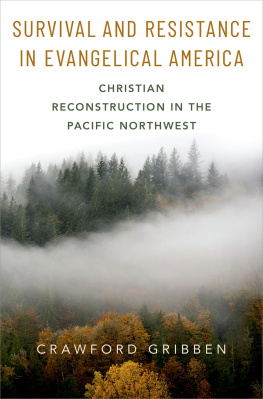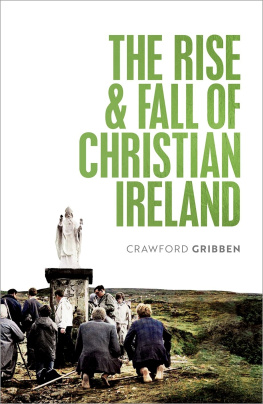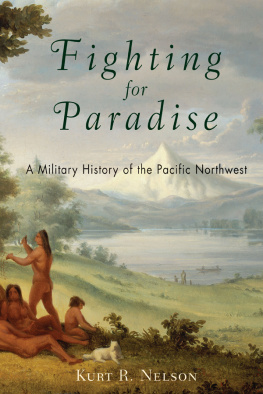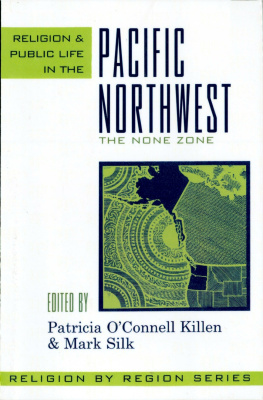Survival and Resistance in Evangelical America

Oxford University Press is a department of the University of Oxford. It furthers the Universitys objective of excellence in research, scholarship, and education by publishing worldwide. Oxford is a registered trade mark of Oxford University Press in the UK and certain other countries.
Published in the United States of America by Oxford University Press
198 Madison Avenue, New York, NY 10016, United States of America.
Oxford University Press 2021
All rights reserved. No part of this publication may be reproduced, stored in a retrieval system, or transmitted, in any form or by any means, without the prior permission in writing of Oxford University Press, or as expressly permitted by law, by license, or under terms agreed with the appropriate reproduction rights organization. Inquiries concerning reproduction outside the scope of the above should be sent to the Rights Department, Oxford University Press, at the address above.
You must not circulate this work in any other form and you must impose this same condition on any acquirer.
Library of Congress Cataloging-in-Publication Data
Names: Gribben, Crawford, author.
Title: Survival and resistance in Evangelical America / by Crawford Gribben.
Description: New York, NY, United States of America. :
Oxford University Press, [2021] |
Includes bibliographical references and index.
Identifiers: LCCN 2020032350 (print) | LCCN 2020032351 (ebook) |
ISBN 9780199370221 (hb) | ISBN 9780199370245 (epub)
Subjects: LCSH: United StatesChurch history20th century. |
EvangelicalismUnited StatesHistory20th century. |
United StatesChurch history21st century. |
EvangelicalismUnited StatesHistory21st century. |
Migration, InternalUnited States. |
EvangelismUnited StatesForecasting.
Classification: LCC BR526 .G76 2021 (print) |
LCC BR526 (ebook) | DDC 277.308/3dc23
LC record available at https://lccn.loc.gov/2020032350
LC ebook record available at https://lccn.loc.gov/2020032351
DOI: 10.1093/oso/9780199370221.001.0001
For Scott Spurlock
The future has never been shaped by majorities but rather by dedicated minorities
, p. 334
Then let them which be in Judaea flee into the mountains
Matthew 24:16
Contents
This book sets out to trace some important trends in evangelical views of politics, society, and culture at the end of white Christian America.
In preparing this work, I have accumulated a great many debts to my colleagues and friends. This book is dedicated to Scott Spurlock. Put most simply, I could not have written it without him. The idea for this book emerged in spring 2010, from conversations that we shared during our employment at Trinity College Dublin, and our discussions of its content continued as we each moved into new positions elsewhere. The project took a major step forward during our often unpredictable road trip around eastern Washington and northern Idaho in the hot, combustible summer of 2015, during which we conducted many of the interviews upon which this book is based, and discussed many of what would become the books central ideas. In making this project possiblefor being a great conversation partner and for much else besidesI owe Scott an enormous debt. I am also grateful for support and encouragement from many colleagues at Queens University Belfast, especially Andrew Holmes, David Livingstone, and Tristan Sturm, and for advice on Christian Reconstruction from John Larkin QC, the Attorney General for Northern Ireland. I have benefited a great deal from conversations with friends and colleagues in other institutions, particularly Anne Brunon-Ernst, R. Scott Clark, Ian Clary, Catherine Clinton, D. G. Hart, Jordan Haug, Jacob Hickman, Steve Knowles, Ryanne Pilgeram, Jeff Sanders, Rebecca Scofield, Adam Sowards, Matthew Avery Sutton, Guillaume Tusseau, and Joe Webster. I have been grateful for the opportunity to discuss this project in seminars and conferences in my own university, at conferences of the Irish Association for the Academic Study of Religions and the British Association for the Study of Religion, as well as in seminar groups at the University of Idaho, Washington State University, Brigham Young University, and Sciences Po, Paris. And I have learned a huge amount from the undergraduate students who have taken my course on the history and anthropology of the end of the world, especially Lucy Wray, and from graduate students working on related themes, especially Benjamin Huskinson, whose sharing of his experience of living in Moscow, Idaho, has been invaluable.
I record my thanks to the many individuals and institutions who were willing to become the subjects of my investigation. While I have been following the literary output of this movement since the mid-1990s, my conversations were carried out in a sequence of long-distance interviews that began in 2013 and in intensive fieldwork that was conducted in the summers
The completion of this book was not without its challenges. One of the most complex things to consider, while completing fieldwork, was whether my own activity of gathering data was connecting individuals, families, congregations, and other social units in ways that complicated their existing relationships. I was also aware of the ways in which some of the more occluded communities that became subjects of this research could repurpose its conclusions for their own ends.
This book is an attempt at historical analysis, rather than a policy intervention or the sounding of an alarm. I recognize that many readers will find material in this book to be disturbing, but they will agree with the advocates of Christian Reconstruction on this, at leastthat there is no such thing as intellectual neutrality. I have my own interpretive presuppositions, which I have discussed elsewhere, but in writing this book I have tried to present my subjects as objectively as I can. Any errors that remain are my own responsibility.
As always, I am especially grateful to my editor, Cynthia Read, whose early enthusiasm for this project was matched by the patience with which she oversaw its completion. But my deepest debts of gratitude are to my family, and especially to Pauline, Daniel, Honor, Finn and Samuel. Mar is uaidh agus is trd agus is chuige at gach n d bhfuil ann. Moladh go deo leis.
Crawford Gribben
Tulaigh na Mulln, June 2019
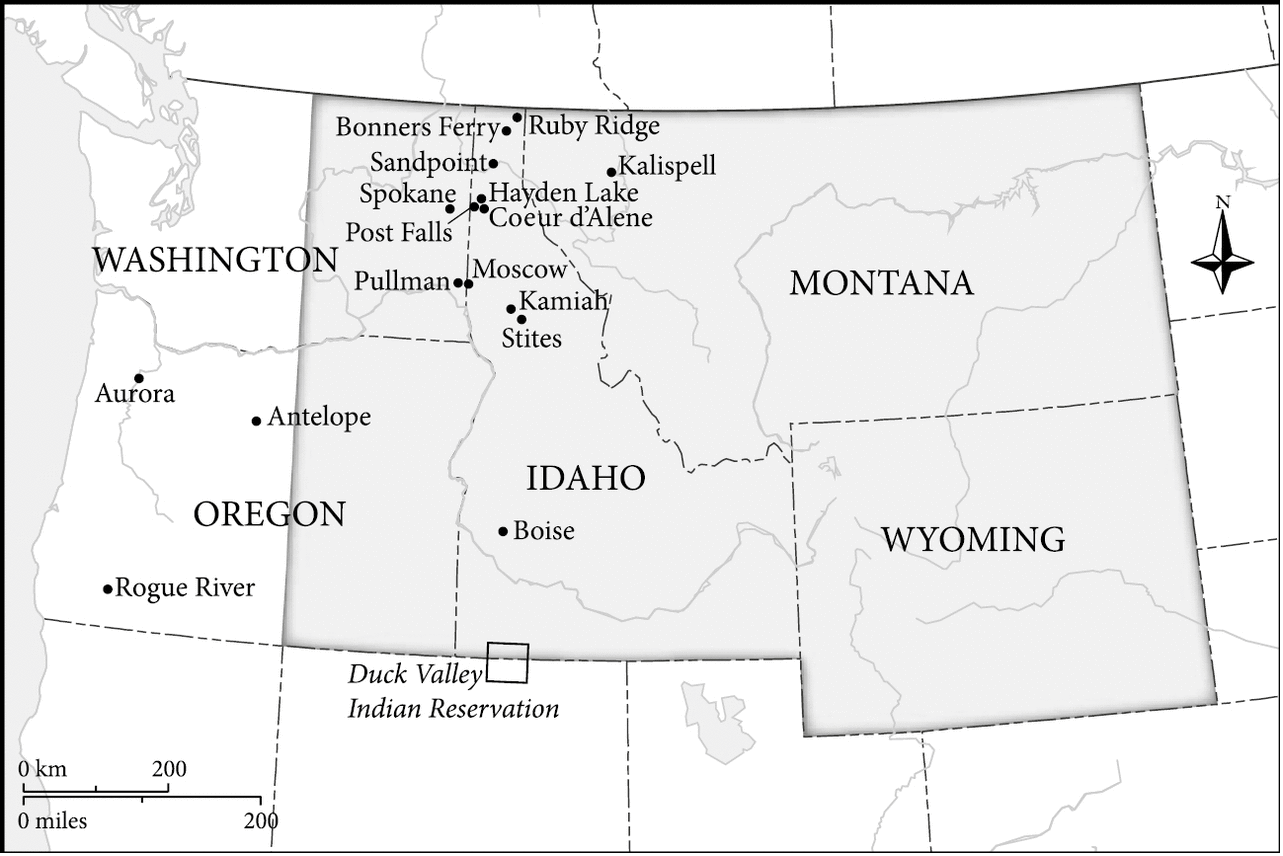
Map 0.1 The American Redoubt
The doctrine of the priesthood of all believers... is a program for not only survival but victory.
American religion is changing. This book documents some important shifts in evangelical political thinking during a period of significant demographic and cultural change, which has provided a context for the revitalization of one of the most controversial religious and political movements in recent American history. This book describes a migration into the Pacific Northwest of religious and political conservatives, among whom and from whom the claims of Christian Reconstruction, or theonomy, as this movement of ideas is often known, are beginning to circulate in modified forms more widely and more effectively than ever before. From their base in northern Idaho, these latter-day theonomists are developing the work of R. J. Rushdoony, Gary North, and others of the first generation of the writers of Christian Reconstruction, reiterating their optimistic view of the future, an eschatological position known as postmillennialism, as well as their expectation that the expansion of Christian influence around the world will be marked by changes in government and by a widespread return to the demands of Old Testament law. While the first generation of Reconstructionists had to fight for the right to provide a distinctively Christian education in private or home schools, the new theonomists have established some very successful educational programs while supporting a liberal arts college that directs students into graduate studies in elite European universities as well as the Ivy League. While the first generation of Reconstructionists promoted their arguments in a media culture of photocopied newsletters and books that appeared under the auspices of minor evangelical publishers, the And, in the last few years, the hostility to abortion that this suggestion represented has been reflected in the trend across Southern states to radically restrict its provision. Theonomists have long predicted that a new America would emerge out of widespread social crisis. Perhaps they are making their own predictions come true. With a more professional presentation, with its ideological edges rubbed smooth, and with significant intellectual centers and increasingly viable communities in the Pacific Northwest, the movement of Christian Reconstruction may never have been as important as it is today.

